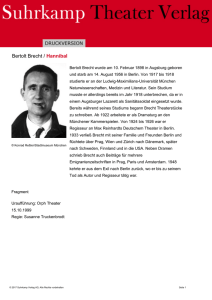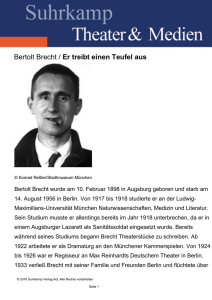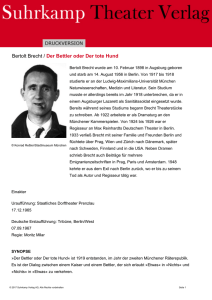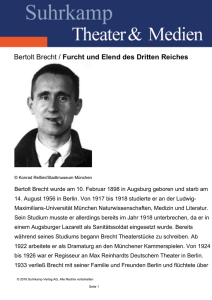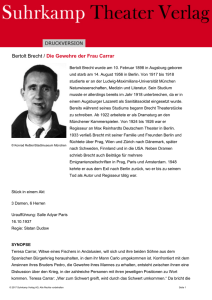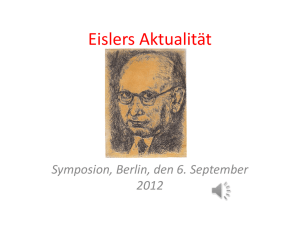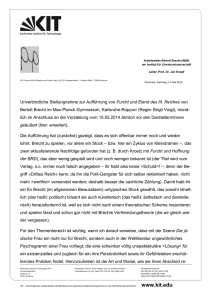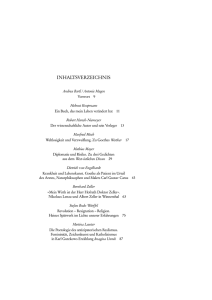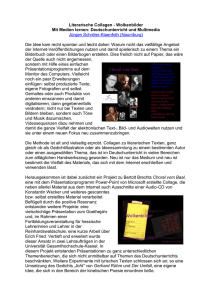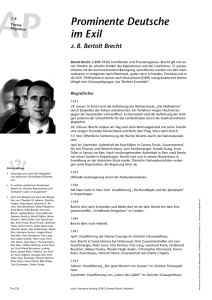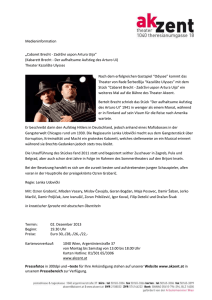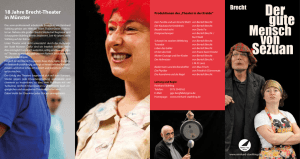GE 212 – Bertolt Brecht: Theatre as Revolution Bertolt Brecht
Werbung
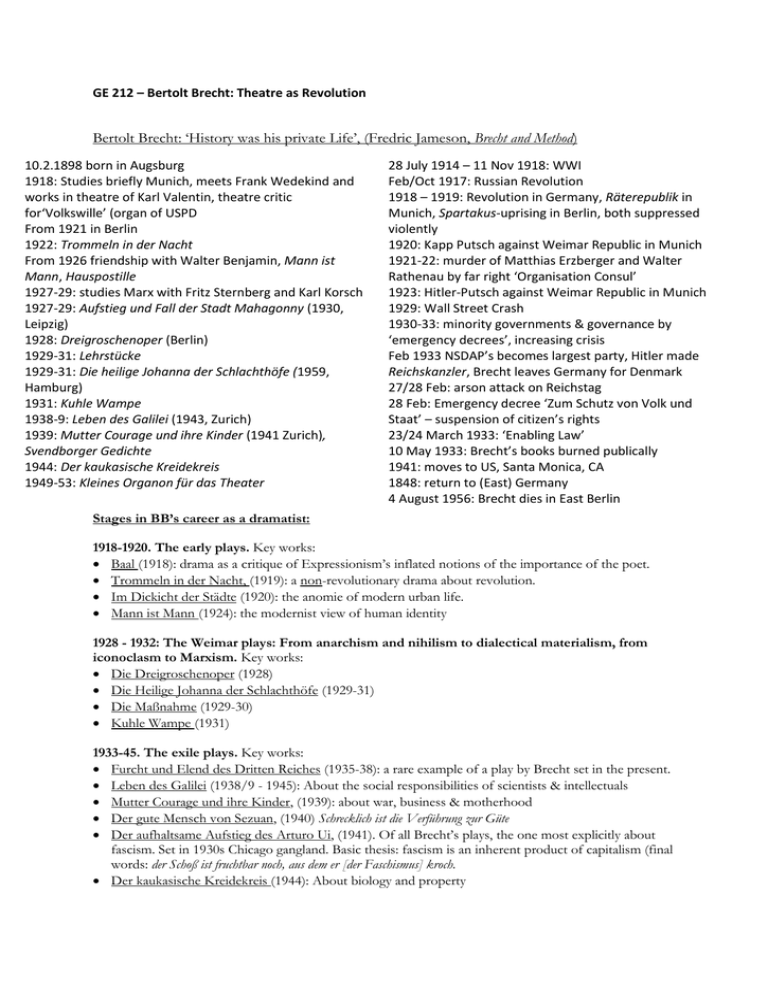
GE 212 – Bertolt Brecht: Theatre as Revolution Bertolt Brecht: ‘History was his private Life’, (Fredric Jameson, Brecht and Method) 10.2.1898 born in Augsburg 1918: Studies briefly Munich, meets Frank Wedekind and works in theatre of Karl Valentin, theatre critic for‘Volkswille’ (organ of USPD From 1921 in Berlin 1922: Trommeln in der Nacht From 1926 friendship with Walter Benjamin, Mann ist Mann, Hauspostille 1927-29: studies Marx with Fritz Sternberg and Karl Korsch 1927-29: Aufstieg und Fall der Stadt Mahagonny (1930, Leipzig) 1928: Dreigroschenoper (Berlin) 1929-31: Lehrstücke 1929-31: Die heilige Johanna der Schlachthöfe (1959, Hamburg) 1931: Kuhle Wampe 1938-9: Leben des Galilei (1943, Zurich) 1939: Mutter Courage und ihre Kinder (1941 Zurich), Svendborger Gedichte 1944: Der kaukasische Kreidekreis 1949-53: Kleines Organon für das Theater 28 July 1914 – 11 Nov 1918: WWI Feb/Oct 1917: Russian Revolution 1918 – 1919: Revolution in Germany, Räterepublik in Munich, Spartakus-uprising in Berlin, both suppressed violently 1920: Kapp Putsch against Weimar Republic in Munich 1921-22: murder of Matthias Erzberger and Walter Rathenau by far right ‘Organisation Consul’ 1923: Hitler-Putsch against Weimar Republic in Munich 1929: Wall Street Crash 1930-33: minority governments & governance by ‘emergency decrees’, increasing crisis Feb 1933 NSDAP’s becomes largest party, Hitler made Reichskanzler, Brecht leaves Germany for Denmark 27/28 Feb: arson attack on Reichstag 28 Feb: Emergency decree ‘Zum Schutz von Volk und Staat’ – suspension of citizen’s rights 23/24 March 1933: ‘Enabling Law’ 10 May 1933: Brecht’s books burned publically 1941: moves to US, Santa Monica, CA 1848: return to (East) Germany 4 August 1956: Brecht dies in East Berlin Stages in BB’s career as a dramatist: 1918-1920. The early plays. Key works: Baal (1918): drama as a critique of Expressionism’s inflated notions of the importance of the poet. Trommeln in der Nacht, (1919): a non-revolutionary drama about revolution. Im Dickicht der Städte (1920): the anomie of modern urban life. Mann ist Mann (1924): the modernist view of human identity 1928 - 1932: The Weimar plays: From anarchism and nihilism to dialectical materialism, from iconoclasm to Marxism. Key works: Die Dreigroschenoper (1928) Die Heilige Johanna der Schlachthöfe (1929-31) Die Maßnahme (1929-30) Kuhle Wampe (1931) 1933-45. The exile plays. Key works: Furcht und Elend des Dritten Reiches (1935-38): a rare example of a play by Brecht set in the present. Leben des Galilei (1938/9 - 1945): About the social responsibilities of scientists & intellectuals Mutter Courage und ihre Kinder, (1939): about war, business & motherhood Der gute Mensch von Sezuan, (1940) Schrecklich ist die Verführung zur Güte Der aufhaltsame Aufstieg des Arturo Ui, (1941). Of all Brecht’s plays, the one most explicitly about fascism. Set in 1930s Chicago gangland. Basic thesis: fascism is an inherent product of capitalism (final words: der Schoß ist fruchtbar noch, aus dem er [der Faschismus] kroch. Der kaukasische Kreidekreis (1944): About biology and property Indicative Bibliography*, all works listed are in the library or available as online resources Brecht, Bertolt, Werke. Große kommentierte Berliner und Frankfurter Ausgabe, Frankfurt & Berlin 1988-2000 (the authoritative complete edition containing commentaries, annotations and introductions to all of Brecht’s works). Brecht, Bertolt, Gesammelte Werke, Frankfurt/M., 1967. The first (West German) edition of Brecht’s collected works. The ‘Schriften zum Theater’ are in volumes 15-17. Brecht, Bertolt, Schriften zum Theater, ed. by Werner Hecht, Frankfurt, 1976. Willett, John, Brecht on Theatre, London, 1978 (a selection of Brecht’s writings on theatre, theory and performance). General: Barnett, David, Brecht in Practice: Theatre, Theory and Performance, London, 2015. Brooker, Peter, Bertolt Brecht : dialectics, poetry, politics, London, 1988. Hecht, Werner, Brecht Chronik 1898-1956, Frankfurt, 1997. Knopf, Jan (ed.), Brecht Handbuch, 5 vols., Stuttgart, 2001. Knopf, Jan, Brecht-Handbuch : Lyrik, Prosa, Schriften : eine Ästhetik der Widersprüche, Stuttgart, 1984 Martin, Carol & Bial, Henry, Brecht Sourcebook, London, 2000. Mews, Siegfried (ed.), Critical Essays on Bertolt Brecht, Boston, 1989. Parker, Stephen, Bertolt Brecht: A Literary Life, London, 2014. Suvin, Darko, To Brecht and Beyond, Brighton, 1984. Speirs, Ronals, Bertolt Brecht, Basingstoke, 1987. Thomson, Peter & Sacks, Glendyr, The Cambridge Companion to Brecht, Cambridge, 2006. Völker, Klaus, Brecht- Kommentar zum dramatischen Werk, Munich, 1983. Willett, John, Brecht in context: Comparative Approaches, London, 1998. Die Maßnahme Steinweg, Reiner (ed.), Das Lehrstück : Brechts Theorie einer politisch-ästhetischen Erziehung, Frankfurt, 1972. Steinweg, Reiner, (ed.) Die Maßnahme; kritische Ausgabe mit einer Spielanleitung, Frankfurt 1972. Die heilige Johanna der Schlachthöfe Knopf, Jan, Bertolt Brecht : "Die heilige Johanna der Schlachthöfe", Frankfurt, 1985. Kuhle Wampe Hecht, Werner (ed.), Kuhle Wampe. Protokoll des Films und Materialien, Frankfurt, 1969. Murray, Bruce, Film and the Left in Germany: From ‘Caligari’ to ‘Kuhle Wampe’, Austin, 1990. Isenberg, Noah, Weimar cinema: an essential guide to classic films of the era, New York, 2009 (contains chapter on Kuhle Wampe) Korte, Helmut, (ed.) Film und Realität in der Weimarer Republic, Munich 1978. (contains analysis of Kulhe Wampe) Mutter Courage und ihre Kinder Hein, Edgar, Bertolt Brecht: Mutter Courage und ihre Kinder: Interpretation, Munich, 1994. Hecht, Werner (ed.), Materialien zu Brechts Mutter Courage und ihre Kinder, Frankfurt 1969. Müller, Klaus-Detlev (ed.), Brechts Mutter Courage und ihre Kinder, Frankfurt, 1982. Thiele, Dieter, Bertolt Brecht: Mutter Courage und ihre Kinder, Frankfurt, 1985 Thomson, Peter, Brecht: Mother Courage and her Children, Cambridge, 1997. *For your essays I expect you to go beyond the indicative bibliography above. Consult the library OPAC, the MLA bibliography, Encore etc.
